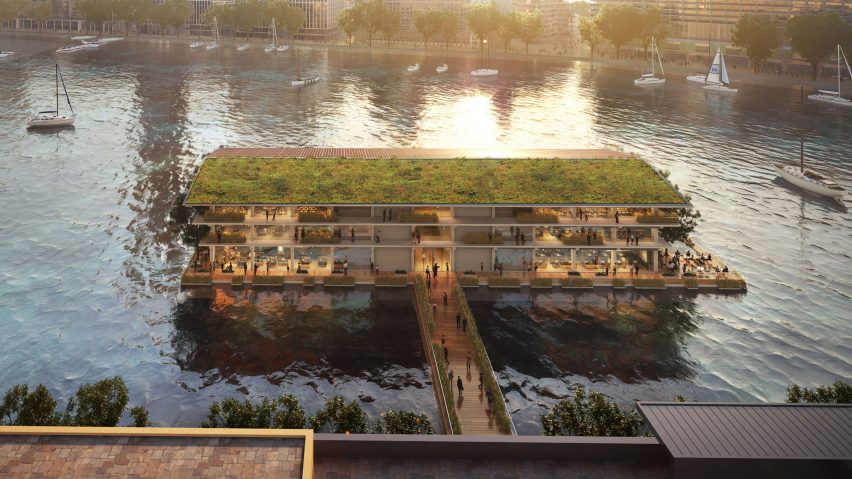Dutch architects Powerhouse Company has designed a floating office in Rotterdam for the Global Center on Adaptation that will be carbon neutral and function off-grid.
The Floating Office Rotterdam (FOR) is set to be moored at the Rijnhaven port on the Maas River, as an example of what Powerhouse Company called "climate-resilient office design".
If sea levels rise due to climate change the office will float rather than flood.
Once complete, the timber structure will have solar panels and a water-based heat-exchange system installed to ensure it is self-sufficient and carbon neutral in operation.
"Designing a sustainable, floating office building was a very challenging commission and we approached it in an integrated way," said Nanne de Ru, founder of Powerhouse Company.
"By using the water of the Rijnhaven to cool the building, and by using the roof of the office as a large energy source, the building is truly autarkic," Ru said. Autarky is to be self-sufficient.
Powerhouse Company designed FOR to reflect the values of the Global Center on Adaptation – a Rotterdam NGO that focuses on the mitigation of climate change through technology, planning and investment.
The building will host the organisation for a period of five to 10 years, before it is either made available to rent or relocated.
FOR will be built offsite from timber – chosen for its minimal carbon footprint – before being towed into position in autumn 2020. It will comprise three-storeys of office space accessed by a boardwalk.
Externally, the offices will be distinguished by a large overhanging pitched roof that will be lined with solar panels on one side. Vegetation on the other side will help keep the building cool.
Recessed balconies around each floor and a pitched roof will shade the office's large windows.
FOR will also have publicly-accessible restaurant with a large outdoor terrace and swimming pool positioned in line with the river.
"As the world's climate changes, extreme weather events and rising sea levels present new challenges for architects," said CEO of the Global Center on Adaptation Patrick Verkooijen.
"Embedding resilient features into a design before disaster strikes not only makes economic sense but it can also help us to mitigate against climate change," he continued.
"I hope it will inspire others to future-proof their infrastructure."
Powerhouse Company is an architecture studio founded in Rotterdam in 2005. Today it also has studios in Beijing, Oslo and Munich.
Other recent projects by the studio include a transparent student centre for Erasmus University in Rotterdam, and proposals for "the slimmest residential tower of Europe" and the conversion of a brutalist bunker into high-rise housing.
Visuals are by Atchain unless stated.

